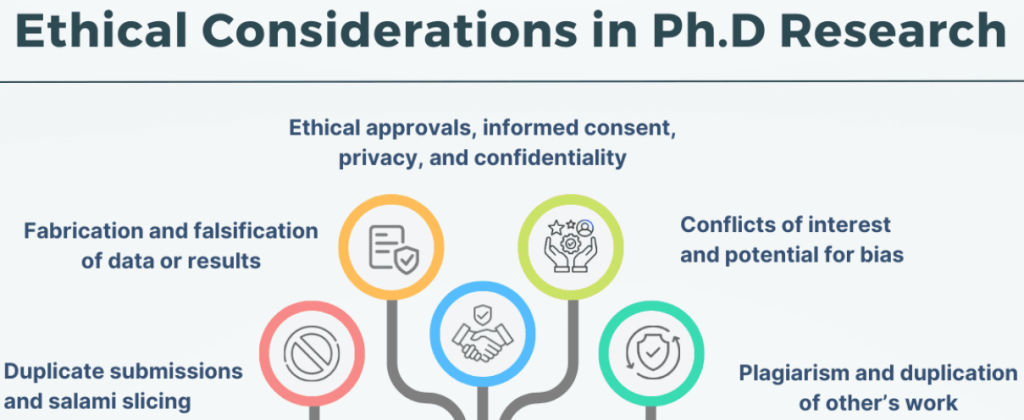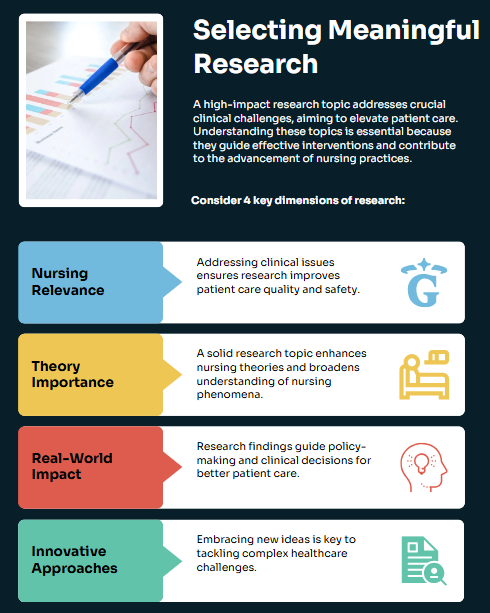
Table of Contents
Embarking on a PhD program in nursing is a significant commitment, demanding years of dedicated research culminating in a substantial dissertation. The foundation of this journey lies in selecting a compelling PhD nursing research topic. This crucial first step can determine the success and impact of your entire doctoral experience. Choosing the right topic isn’t simply about identifying an area of interest; it’s about finding a research question that is both significant and feasible within the constraints of your time, resources, and expertise.
This article explores a comprehensive approach to identifying a compelling PhD nursing research topic, guiding you through the process from initial brainstorming to final refinement.
Steps to Choosing a Powerful PhD Nursing Research Topic
1. Self-Reflection and Passion:
The journey to finding a suitable PhD nursing research topic begins with introspection. Consider your nursing career trajectory, your passions, and your areas of expertise. What clinical challenges have you encountered that sparked your curiosity? What patient populations or healthcare systems intrigue you? What are the gaps in existing nursing knowledge that you believe require further investigation?
A strong PhD nursing research topic emerges from a place of genuine interest and commitment. This personal connection will fuel your motivation throughout the arduous process of research and writing. Don’t underestimate the power of pursuing a topic that genuinely excites you – it will make the demanding work significantly more rewarding.
2. Exploring Existing Literature:
Once you have some initial ideas, it’s crucial to delve into the existing nursing literature. This involves conducting thorough literature reviews to understand the current state of knowledge within your area of interest. What research has already been done? What are the major findings? What are the limitations of existing studies? Identifying these gaps in the literature is crucial for crafting a novel and impactful PhD nursing research topic. This step will not only help you refine your research question but also provide a strong foundation for your dissertation. Look for areas where more research is needed, where conflicting findings exist, or where new methodologies could offer valuable insights.
3. Identifying Research Gaps and Addressing Unmet Needs:
A compelling PhD nursing research topic typically addresses an unmet need within the nursing profession or healthcare system. This could involve exploring a poorly understood clinical phenomenon, investigating the effectiveness of a novel intervention, or evaluating the impact of a specific policy or practice change. Consider the broader implications of your research. Will your findings have the potential to improve patient outcomes, enhance nursing practice, or inform healthcare policy?
A strong PhD nursing research topic should demonstrate a clear and significant potential to contribute to the field of nursing. This is critical when pitching your proposal to your committee and justifying the allocation of resources.
4. Feasibility and Resources:
While choosing a significant PhD nursing research topic is paramount, it’s equally important to consider the practical aspects of conducting the research. Are the necessary resources available to you? This includes access to data, participants, equipment, and mentorship. Consider the time constraints of your PhD program. Ambitious, groundbreaking research may be ideal, but it might not be feasible within the timeframe allotted.
A well-defined, manageable PhD nursing research topic is more likely to lead to successful completion of your dissertation. Assess your own skills and limitations realistically. Seek guidance from your advisor to determine the feasibility of your chosen topic.
5. Refining Your Research Question:
Once you have a potential PhD nursing research topic, you need to formulate a clear and concise research question. This question should guide your entire research process, providing a focus for your data collection and analysis. A well-defined research question is usually expressed in the form of a question that is specific, measurable, achievable, relevant, and time-bound (SMART). Ensure your research question is focused enough to be adequately addressed within the scope of your dissertation but broad enough to allow for meaningful exploration.
6. Choosing the Appropriate Methodology:
The choice of research methodology is crucial and heavily influenced by your PhD nursing research topic. Different research questions lend themselves to different methodologies. Qualitative research explores experiences and perspectives, while quantitative research focuses on numerical data and statistical analysis. Mixed-methods research combines both approaches to provide a more comprehensive understanding. Choosing the appropriate methodology ensures that your research question can be effectively answered and that the results are valid and reliable. This decision should be made in close consultation with your advisor.
7. Ethical Considerations:
Before you finalize your PhD nursing research topic, it’s vital to consider the ethical implications of your research. Will your study involve human subjects? If so, you must obtain ethical approval from your institution’s research ethics board (REB) or IRB. You need to ensure that your research adheres to ethical guidelines, protecting the rights and well-being of your participants. This involves obtaining informed consent, maintaining confidentiality, and minimizing potential risks to participants. Thoroughly understanding and adhering to ethical standards is paramount.

8. Seeking Mentorship and Feedback:
Throughout the process of selecting a PhD nursing research topic, seeking guidance from experienced mentors is crucial. Your PhD advisor will play a key role in helping you refine your research question, identify appropriate methodologies, and navigate the complexities of the research process. Don’t hesitate to discuss your ideas with colleagues, professors, and other researchers in your field. Their feedback can be invaluable in helping you identify potential pitfalls and strengthen your research proposal. Regularly seeking feedback will significantly improve the quality of your research and help you stay on track.
9. Considering the Impact and Dissemination:
A compelling PhD nursing research topic should have the potential to make a significant contribution to the field of nursing. Think about the potential audience for your research and how your findings will be disseminated. Will your research inform clinical practice, influence healthcare policy, or contribute to the body of nursing knowledge? Consider publishing your findings in peer-reviewed journals or presenting your work at national and international conferences. Planning for the dissemination of your research from the outset helps ensure its maximum impact.
10. Iterative Process and Flexibility:
Choosing a PhD nursing research topic is not a linear process. It is an iterative journey that involves refinement and adjustment along the way. Be prepared to adjust your research question, methodology, or even your topic entirely, based on feedback, emerging findings, and changing circumstances. Flexibility and adaptability are essential qualities for successful PhD candidates. The initial research question may evolve as you delve deeper into the literature and your understanding grows. This is a natural part of the process and demonstrates a willingness to refine your thinking and improve the quality of your research.
Avoiding Common Mistakes in Choosing a PhD Nursing Research Topic
Embarking on a PhD journey in nursing is a significant undertaking, demanding years of dedication and culminating in a substantial research contribution. Central to this success is the selection of a compelling and feasible PhD nursing research topic. Many aspiring researchers, however, stumble at this crucial first hurdle, making choices that ultimately hinder their progress and satisfaction. Here are the common pitfalls in choosing a PhD nursing research topic and strategies to avoid them.
Too Broad Topic
A sweeping, vaguely defined area like “improving patient care” is simply unmanageable within the constraints of a PhD. Such a broad PhD nursing research topic necessitates extreme narrowing of focus, often leading to frustration and a lack of depth in the final dissertation. Instead, focus on a specific, well-defined problem within a manageable scope. For instance, instead of “improving patient care,” a more suitable topic might be “the impact of a specific intervention on reducing medication errors among elderly patients with polypharmacy.” The key is to identify a specific gap in existing knowledge that your research can directly address.
Too Narrow Topic
Conversely, selecting a topic that is too narrow is equally problematic. While specificity is crucial, choosing a topic so niche that it yields minimal meaningful results is unproductive. A PhD requires significant intellectual contribution; a tiny, incremental study might not meet the necessary standards. The balance lies in identifying a focused question that allows for in-depth exploration within a clinically relevant context. Before settling on a PhD nursing research topic, thoroughly review existing literature to ensure sufficient scope for analysis and interpretation.
Lack of Feasibility
Another common error is failing to consider feasibility. Choosing a PhD nursing research topic that is logistically or resource-intensive without securing adequate support beforehand can be disastrous. Factors like access to participants, data collection methods, ethical approvals, and available funding must be carefully assessed. A fascinating, innovative topic becomes worthless if it’s impossible to conduct the research effectively. Preliminary investigation into the practicality of data collection and analysis is paramount before committing to a PhD nursing research topic. Consult with your advisor early and often to evaluate the feasibility of your chosen direction.
Lack of Relevance and Significance
A PhD nursing research topic should contribute meaningfully to the field, addressing a pressing clinical problem or advancing theoretical understanding. A topic that lacks practical implications or theoretical grounding will struggle to justify the investment of time and resources. Before finalizing your choice, ask yourself: Will this research genuinely impact nursing practice or policy? Will it advance our understanding of a significant nursing issue? A clearly articulated rationale for the chosen topic is essential.
Lack of Personal Interest and Passion
Finally, many aspiring PhD students underestimate the importance of personal interest and passion. The PhD journey is long and challenging; a topic that genuinely excites and motivates you is crucial for maintaining momentum and enthusiasm. While selecting a relevant and significant topic is imperative, choosing one that aligns with your own research interests will enhance your commitment and overall experience. A strong personal connection to your PhD nursing research topic will translate into more focused effort and ultimately a higher quality dissertation.
Carefully avoiding these common pitfalls and following the suggested strategies can help aspiring PhD nurses to significantly increase their chances of selecting a successful and rewarding research topic. The process requires careful planning, thorough literature review, realistic assessment of feasibility, and a deep personal connection to the chosen area of inquiry. A well-chosen PhD nursing research topic forms the foundation for a successful and impactful research career.
Examples of Powerful PhD Nursing Research Topics
- The Impact of Artificial Intelligence on Nursing Practice and Patient Outcomes: This topic explores the burgeoning use of AI in nursing, investigating its effects on efficiency, accuracy of diagnoses, patient satisfaction, and overall healthcare costs. A PhD could delve into the ethical implications, the potential for bias in AI algorithms, and the necessary changes in nursing education and training to effectively integrate AI tools.
- Longitudinal Study of the Mental Health and Well-being of Nurses during and Post-Pandemic: This research could utilize a cohort design to track the mental health of nurses throughout the COVID-19 pandemic and beyond. It would investigate the impact of prolonged stress, burnout, moral injury, and trauma on nurses’ well-being, identifying contributing factors and developing effective interventions to support their mental health.
- Developing and Evaluating a Novel Intervention to Reduce Health Disparities in a Specific Vulnerable Population: This could focus on a particular underserved group (e.g., rural communities, minority populations, homeless individuals) and design a tailored intervention to address a specific health disparity (e.g., diabetes management, access to preventative care, maternal mortality). The PhD research would involve rigorous evaluation of the intervention’s effectiveness and impact.
- The Role of Genomics and Personalized Medicine in Nursing Practice: This cutting-edge topic explores how advancements in genomics and personalized medicine are transforming nursing care. A PhD could investigate the implications for nursing assessment, planning, implementation, and evaluation, focusing on the ethical and practical challenges of integrating genomic information into patient care.
- The Effectiveness of Telehealth Interventions in Managing Chronic Conditions: This research could evaluate the efficacy and cost-effectiveness of different telehealth interventions for managing chronic diseases like heart failure, diabetes, or COPD. It could compare telehealth to traditional in-person care, exploring patient satisfaction, adherence to treatment plans, and clinical outcomes. The research could also address challenges related to access, technology, and equity in telehealth delivery.
Frequently Asked Questions about Choosing a PhD Nursing Research Topic
Embarking on a PhD journey is a significant undertaking, and selecting the right research topic is arguably the most crucial step. For aspiring doctoral nurses, this decision shapes not only the next few years of their lives but also their future contributions to the nursing profession and healthcare as a whole. Finding the perfect PhD nursing research topic can feel overwhelming, but with careful consideration and planning, the process can be both rewarding and illuminating.
Q1: How do I identify a relevant and impactful PhD nursing research topic?
Choosing a PhD nursing research topic requires careful reflection on your interests, expertise, and the current needs of the nursing field. Start by exploring your passion within nursing. What clinical areas or patient populations resonate most with you? What problems or challenges have you observed in your practice that warrant further investigation? Review recent literature in nursing journals to identify research gaps, controversies, or emerging trends. Consider the broader implications of your research: will it improve patient outcomes, enhance nursing practice, inform healthcare policy, or advance nursing theory? A strong PhD nursing research topic is not just interesting; it’s relevant, timely, and potentially impactful.

Q2: How can I ensure my PhD nursing research topic is feasible within the timeframe of my program?
Feasibility is paramount. A truly innovative and ambitious PhD nursing research topic might require more time and resources than are available within the typical timeframe of a doctoral program. Consider the scope of your research question: is it manageable within the constraints of your program’s timeline, your access to resources (data, participants, equipment), and your supervisory support? Start with a focused research question rather than a broad, sweeping topic. Pilot studies can also be invaluable for testing your methodology and assessing feasibility before embarking on the full-scale research project. Consult with your advisor early and often to refine your PhD nursing research topic and develop a realistic research plan.
Q3: What resources are available to help me refine my PhD nursing research topic?
Numerous resources exist to support you throughout the process. Your doctoral advisor will be your primary resource, providing guidance, feedback, and mentorship. University libraries offer access to vast databases of scholarly articles and research literature. Attend conferences and workshops related to your area of interest to network with other researchers and learn about current research trends. Engage in discussions with colleagues and clinical mentors to gain different perspectives and identify potential research avenues.
Explore existing datasets and consider the possibility of secondary data analysis, which can significantly reduce the time and resources required for data collection. Don’t hesitate to tap into the expertise of other faculty members who may have relevant experience or knowledge that can enhance your PhD nursing research topic.
Q4: How do I formulate a strong research question for my PhD nursing research topic?
A well-defined research question is the cornerstone of a successful doctoral project. It should be clear, concise, and focused, specifying the variables of interest and the relationship between them. The question should be answerable within the scope of your study and contribute meaningfully to the existing body of knowledge. The use of PICO (Population, Intervention, Comparison, Outcome) framework can be helpful in structuring your research question.
For instance, instead of a broad topic like “nurse burnout,” a more focused research question might be: “What is the effect of mindfulness-based stress reduction on the levels of burnout among emergency room nurses compared to a control group receiving standard support?” This refined question offers a clearer path towards a feasible and impactful PhD nursing research topic.
Q5: How important is originality in choosing a PhD nursing research topic?
While entirely novel research is ideal, it’s often unrealistic. A strong PhD nursing research topic can build upon existing research by extending previous findings, replicating studies in different populations, or addressing limitations in prior studies. The key is to demonstrate a clear contribution to the field, whether through methodological innovation, the application of existing knowledge to a new context, or the development of a new theoretical understanding. Your advisor can help you assess the originality and significance of your proposed research. Even incremental advances can contribute significantly to nursing knowledge and practice.
Q6: How do I deal with potential setbacks and challenges during my PhD research journey?
Research is rarely a linear process. Expect to encounter setbacks, unexpected challenges, and moments of doubt. Maintaining open communication with your advisor is vital. They can provide guidance, support, and help you navigate obstacles. Regularly review your progress, adjust your research plan as needed, and seek feedback from peers and mentors. Remember that setbacks are opportunities for learning and growth. The process of overcoming challenges will enhance your resilience and expertise as a researcher. A well-defined plan, a supportive advisor, and a passionate interest in your PhD nursing research topic will help you persevere through any difficulties.

The Bottom Line
Choosing a compelling PhD nursing research topic requires careful consideration of personal interests, feasibility, significance, and ethical considerations. By following the steps outlined in this article, you can increase your chances of selecting a research question that will lead to a successful and impactful doctoral dissertation. Remember, the journey is challenging but rewarding, and selecting a topic that resonates deeply with you is the first and arguably the most critical step towards a successful PhD. Embrace the process, seek guidance, and remember the profound impact your research can have on the nursing profession and patient care.
Get Professional PhD Nursing Research Paper Writing Service
At PhD Nurse Writer, we can help you to craft authentic and top-notch PhD nursing papers. Our service caters for topic suggestion, paper writing, proofreading, editing, formatting and plagiarism removal. Apart from nursing research papers, we can also assist you with writing essays, case studies and dissertations.





